 W
WJohn Brown Baldwin was a Virginia lawyer and Democratic politician, who served one term in Virginia House of Delegates before the Virginia Secession Convention of 1861, during which he was a Unionist. During the American Civil War, Baldwin believed his primary loyalty was to his state, and served as one of Virginia's representatives to the First and Second Confederate Congresses. He became one of the leading critics of President Jefferson Davis, who was seen by many as usurping the Confederacy's states' rights principles. During Congressional Reconstruction, Baldwin became Speaker of the Virginia House of Delegates.
 W
WWilliam Gay Brown Sr. was a nineteenth-century politician and lawyer from Virginia, who was twice elected to the Virginia General Assembly and thrice to the U.S. House of Representatives. He also served at the Virginia Constitutional Convention of 1850 and later opposed secession at the Virginia Secession Convention of 1861. A leading Unconditional Unionist during the American Civil War, he became one of the founders of West Virginia.
 W
WAllen Taylor Caperton was an American politician who was a United States Senator from the State of West Virginia in 1875–1876. He was a member of the Democratic Party. He had served in the Virginia House of Delegates and Virginia State Senate before the American Civil War. During the Civil War, he served as a Confederate States Senator.
 W
WJohn Snyder Carlile was an American merchant, lawyer, and politician, including a United States Senator. A strong supporter of the Union cause during the American Civil War, he represented the loyalist faction of Virginia, which was eventually separated into two distinct states.
 W
WSherrard Clemens was a nineteenth-century politician and lawyer from Virginia and Missouri. He was a cousin to author Samuel L. Clemens. He has a town named after himself which is in Marshall County West Virginia.
 W
WJohn Critcher was a U.S. Representative from Virginia.
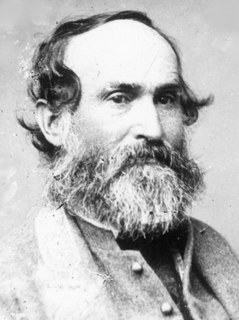 W
WJubal Anderson Early was a Virginia lawyer and politician who became a Confederate general during the American Civil War. Trained at the United States Military Academy, Early resigned his U.S. Army commission after the Second Seminole War and his Virginia military commission after the Mexican–American War, in both cases to practice law and participate in politics. Accepting a Virginia and later Confederate military commission as the American Civil War began, Early fought in the Eastern Theater throughout the conflict. He commanded a division under Generals Stonewall Jackson and Richard Ewell, and later commanded a corps. A key Confederate defender of the Shenandoah Valley, during the Valley Campaigns of 1864, Early made daring raids to the outskirts of Washington, D.C., and as far as York, Pennsylvania, but was crushed by Union forces under General Philip Sheridan, losing over half his forces and leading to the destruction of much of the South's food supply. After the war, Early fled to Mexico, then Cuba and Canada, and upon returning to the United States took pride as an "unrepentant rebel." Particularly after the death of Gen. Robert E. Lee in 1870, Early delivered speeches establishing the Lost Cause position. Early helped found the Southern Historical Society and memorial associations.
 W
WJohn Echols was a general in the Confederate States Army during the American Civil War.
 W
WMuscoe Russell Hunter Garnett, was a nineteenth-century politician and lawyer from Virginia.
 W
WWilliam Leftwich Goggin was a nineteenth-century Whig politician and lawyer from Virginia.
 W
WJohn Goode Jr. was a Virginia Democratic politician, lawyer and slaveowner who served in the Virginia House of Delegates representing Bedford County before the American Civil War, for which he voted during the Virginia Secession Convention, then served in the Confederate Congress and on the staff of General Jubal Early during the conflict. After the conflict, he moved to Norfolk, again won election to the House of Delegates, and then represented Virginia's 2nd congressional district for three terms during the postbellum United States House of Representatives and lastly represented Norfolk and was elected chairman of the Virginia Constitutional Convention of 1902. Goode also served as the acting Solicitor General of the United States during the presidency of fellow Democrat Grover Cleveland.
 W
WChester Dorman Hubbard was a two-term U.S. Representative from West Virginia, who previously served in the Virginia General Assembly and Virginia Secession Convention of 1861 before the American Civil War and who helped found the state of West Virginia.
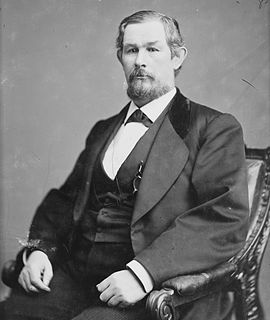 W
WEppa Hunton II was a Virginia lawyer and soldier who rose to become a brigadier general in the Confederate Army during the American Civil War. After the war, he served as a Democrat in both the United States House of Representatives and then the United States Senate from Virginia.
 W
WJohn Janney was an influential member of the Whig Party in Virginia prior to its demise, delegate to the Virginia General Assembly from Loudoun County and served as President of the Virginia Secession Convention in 1861.
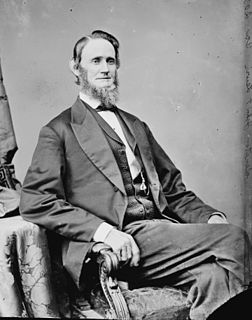 W
WJohn Francis Lewis was an American planter and politician from Rockingham County, Virginia. He served two terms as the ninth and 14th Lieutenant Governor of Virginia and represented Virginia as a Republican in the United States Senate during the Reconstruction period after the Civil War.
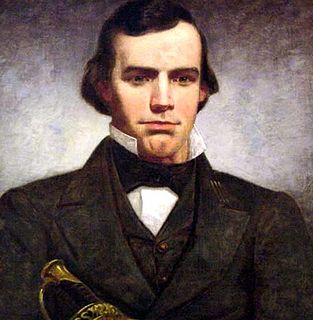 W
WJohn Quincy Marr was a Virginia militia company captain and the first Confederate soldier killed by a Union soldier in combat during the American Civil War. Marr was killed at the Battle of Fairfax Court House, Virginia on June 1, 1861. Previously one of Fauquier County's two delegates to the Virginia Secession Convention of 1861, Marr initially opposed his state's secession from the Union but ultimately supported secession, as did voters shortly before his fatal skirmish.
 W
WWilliam McComas was a Virginia lawyer and politician who also served in the Virginia Senate, United States House of Representatives and voted against secession in the Virginia Secession Convention of 1861. During the American Civil War, although some of his sons enlisted on opposing sides and West Virginia was created, he continued to serve as a federal judge in Union-held territory.
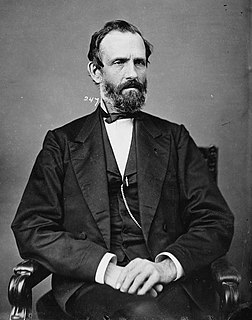 W
WJames Clark McGrew was an American politician, merchant, banker and hospital director from Virginia and West Virginia.
 W
WWilliam Ballard Preston was an American politician who served as a Confederate States Senator from Virginia from February 18, 1862, until his death in November. He previously served as the 19th United States Secretary of the Navy from 1849 to 1850. He is also the cousin of William Campbell Preston and William Preston.
 W
WAlexander Hugh Holmes Stuart was a prominent Virginia lawyer and American political figure associated with several political parties. Stuart served in both houses of the Virginia General Assembly, as a U.S. Congressman (1841-1843), and as the Secretary of the Interior. Despite opposing Virginia's secession and holding no office after finishing his term in the Virginia Senate during the American Civil War, after the war he was denied a seat in Congress. Stuart led the Committee of Nine, which attempted to reverse the changes brought by Reconstruction. He also served as rector of the University of Virginia.
 W
WGeorge William Summers was an attorney, politician, and judge from Virginia.
 W
WWilliam Thomas Sutherlin was a tobacco planter, distributor, industrialist, Confederate quartermaster and politician. He served as mayor of Danville, Virginia (1855-1861), as its delegate to the Virginia Secession Convention of 1861 and later for one term in the Virginia House of Delegates (1871-1873) Sutherlin's plantation home became the temporary residence for President of the Confederate States of America Jefferson Davis and his Cabinet from April 3 – April 10, 1865, the week before Gen. Robert E. Lee surrendered the Army of Northern Virginia at Appomattox Courthouse.
 W
WJohn Tyler was the tenth president of the United States, serving from 1841 to 1845 after briefly holding office as the tenth vice president in 1841; he was elected vice president on the 1840 Whig ticket with President William Henry Harrison. Tyler succeeded to the presidency after Harrison's death in April 1841, only a month after the start of the new administration. He was a stalwart supporter and advocate of states' rights, and he adopted nationalistic policies as president only when they did not infringe on the powers of the states. His unexpected rise to the presidency posed a threat to the presidential ambitions of Henry Clay and other politicians, and left Tyler estranged from both major political parties.
 W
WWilliams Carter Wickham was a Virginia lawyer and politician. A plantation owner who served in both houses of the Virginia General Assembly, Wickham also became a delegate to the Virginia Secession Convention of 1861, where he voted against secession, but after fellow delegates and voters approved secession, he joined the Confederate States Army and rose to the rank of cavalry general, as well as became a Confederate States Congressman near the end of the American Civil War. Later, Wickham became a Republican and helped rebuild Virginia's infrastructure after gaining control of the heavily damaged Virginia Central Railroad, which he repaired and helped merge into the Chesapeake and Ohio Railway company. Cooperating with financier Collis Huntington, Wickham developed coal resources and the Newport News Shipyard. He was also again elected to the Virginia Senate. His son Henry T. Wickham also became a lawyer and would work with his father and eventually twice become the speaker pro tempore of the Virginia Senate.
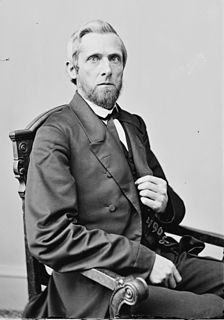 W
WWaitman Thomas Willey was an American lawyer and politician from Morgantown, West Virginia. One of the founders of the state of West Virginia during the American Civil War, he served in the United States Senate representing first the Restored Government of Virginia and became one of the new state of West Virginia's first two Senators.
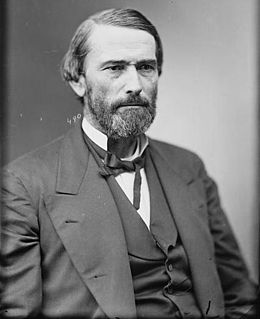 W
WBenjamin Wilson was an American lawyer and Democratic politician who served as a United States Representative from West Virginia) (1875–1883) and as an assistant attorney general during the administration of President Grover Cleveland.
 W
WHenry Alexander Wise was an American lawyer and politician from Virginia. He was a U.S. Representative and Governor of Virginia, and US Minister to Brazil. As Governor, he was much involved in the 1859 trial of abolitionist John Brown. During the American Civil War, he was a general in the Confederate States Army. He was the father of Richard Alsop Wise and John Sergeant Wise, who both served as U.S. Representatives.